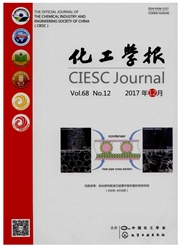

 中文摘要:
中文摘要:
将渗透汽化应用于醇/水体系的分离,具有诸多显著的优势。然而,目前的研究大都基于二元体系,而实际的应用体系是多元的,还包含少量无机盐和糖类等,它们的存在对膜的性能具有一定的影响。本文研究了NaCl、KCl和MgCl23种无机盐的加入对聚二甲基硅氧烷(PDMS)/陶瓷复合膜渗透汽化性能的影响。结果表明,在313 K,无机盐的加入使复合膜的分离因子和通量均有所提高。其中二价盐MgCl2对渗透汽化性能的影响最为显著,分离因子最大提高到醇/水体系的2.8倍。而一价盐NaCl和KCl的加入,使分离因子分别提高为醇/水体系的2.5倍和2.4倍。同时借助于Setschenow扩展方程计算了乙醇活度,对实验结果进行了初步的解释。
 英文摘要:
英文摘要:
There are many significant advantages when pervaporation is used in the separation of ethanol/ water system. The current studied systems are mainly the binary feed mixtures, but the real systems are commonly multi-component mixtures and might include inorganic salts and sugars, which may have effects on the pervaporation performance of the membrane. In this work the effects of three inorganic salts (NaCl, KCl and MgCl2) on the pervaporation performance of polydimethylsiloxane (PDMS) /ceramic composite membranes were studied. The results showed that the addition of inorganic salts caused simultaneously the increase of the flux and the separation factor. Among the three salts, MgCl2had the most notable effect on the pervaporation performance. The separation factors of the tertiary system were 2.8, 2.5 and 2.4 times of those of the ethanol/water binary system for MgC12, NaCl and KCl respectively. The experimental phenomena could be explained by the ethanol activity, which was calculated by using the Setschenow empirical equation.
 同期刊论文项目
同期刊论文项目
 同项目期刊论文
同项目期刊论文
 Preparation of Pd-B/TiO2 amorphous alloy catalysts and their performance on liquid-phase hydrogenati
Preparation of Pd-B/TiO2 amorphous alloy catalysts and their performance on liquid-phase hydrogenati The oxidative stream reforming of methane to syngas in a thin tubular mixed-conducting membrane reac
The oxidative stream reforming of methane to syngas in a thin tubular mixed-conducting membrane reac A new route for the fabrication of TiO2 ultrafiltration membranes with suspension derived from a wet
A new route for the fabrication of TiO2 ultrafiltration membranes with suspension derived from a wet A novel route to synthesize nano-crystalline Ba0.5Sr0.5Co0.8Fe0.2O3?δ perovskite oxide at high tempe
A novel route to synthesize nano-crystalline Ba0.5Sr0.5Co0.8Fe0.2O3?δ perovskite oxide at high tempe Polydimethylsiloxane (PDMS)/ceramic composite membrane with high flux for pervaporation of ethanol-w
Polydimethylsiloxane (PDMS)/ceramic composite membrane with high flux for pervaporation of ethanol-w Chemical expansion, crystal structural stability, and oxygen permeability of SrCo0.4Fe0.6-xAlxO3?δ o
Chemical expansion, crystal structural stability, and oxygen permeability of SrCo0.4Fe0.6-xAlxO3?δ o Organic–inorganic composite pervaporation membranes prepared by self-assembly of polyelectrolyte mul
Organic–inorganic composite pervaporation membranes prepared by self-assembly of polyelectrolyte mul Improving performance of a dense membrane reactor for thermal decomposition of CO2 via surface modif
Improving performance of a dense membrane reactor for thermal decomposition of CO2 via surface modif Synthesis of nanocrystalline conducting composite oxides based on a non-ion selective combined compl
Synthesis of nanocrystalline conducting composite oxides based on a non-ion selective combined compl Match of thermal performances between the membrane and the support for supported dense mixed-conduct
Match of thermal performances between the membrane and the support for supported dense mixed-conduct A self-catalytic mixed-conducting membrane reactor for effective production of hydrogen from methane
A self-catalytic mixed-conducting membrane reactor for effective production of hydrogen from methane Modeling of relationship between water permeability and microstructure parameters of ceramic membran
Modeling of relationship between water permeability and microstructure parameters of ceramic membran 期刊信息
期刊信息
